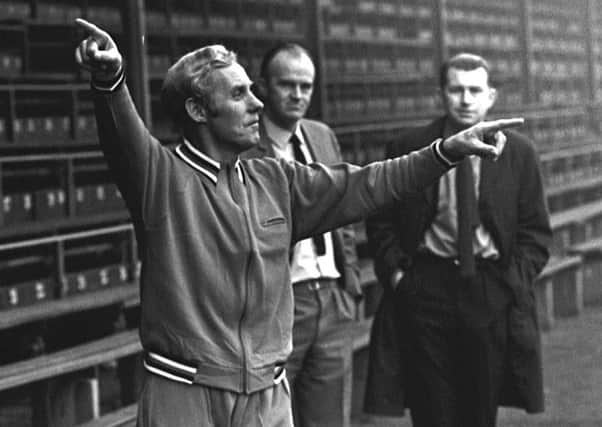Bobby Brown 1923-2020: Architect of one of Scotland’s greatest-ever victories


Brown was perhaps not as well-known as he ought to have been given this achievement. One reason for this is that he outlived so many of his peers. Brown, who has passed away at the age of 96, was Rangers’ oldest living player. He carried the torch for his former team-mates with the steady hand expected of a goalkeeper.
He also did so with great dignity and was always immaculately turned out, something he credited to the enduring influence of Rangers managerial great Bill Struth. “He still guides me all of the time,” he said in an interview with The Athletic website late last year. Brown also expressed the hope that when Rangers won the league again, “I am still on this planet”. Should Steven Gerrard’s side clinch a longed-for title this season it will be a popular move if the achievement is dedicated to Brown, who grew to love the Ibrox club. “I’d like like to still be on the planet to see them win the league and be back on top in Europe,” he said in November.
Advertisement
Hide AdAdvertisement
Hide Ad“And I mean really back on top because that’s how I always identify with Rangers. It was a wonderful atmosphere and club to play for, and a terrific education for the years I was there. They set me up for life”
The news of Brown’s death was announced by the Ibrox club, whose chairman David King described Brown as a “genuine Rangers and Scotland legend”. There can be little argument about that. Born in Dunipace, Brown joined Rangers from Queen’s Park in 1946, the same year as he made his Scotland debut in a 2-2 draw against Belgium. He went on to become a pivotal part of Rangers’ famous Iron Curtain defence, keeping 109 clean sheets in 269 games for the club. George Young, Jock Shaw, Willie Woodburn, Ian McColl and Sammy Cox were other members of a famous rearguard.
Brown was a member of the side that secured Scottish football’s first ever treble in 1949 under Struth.
He earned five international caps in total. His most significant contribution to the international side would come in the dugout.
He built his reputation as a manager during a nine-year tenure at St Johnstone, twice earning promotion to the top flight. Such steady stewardship earned him a chance to lead Scotland. No one man had ever wielded so much power when it came to handing out caps as Brown until that point, with the national team previously chosen by a committee.
His first team sheet occupies an enduring place in Scottish football folklore. It’s suggested he had not even met key players such as Denis Law before his first match in charge – against England in 1967.
Among those he handed a debut to was Celtic goalkeeper Ronnie Simpson, his former Queen’s Park understudy. According to a biography of Brown by author Jack Davidson, when the manager announced Simpson would play his first game against England, what had happened the last time a Celtic goalkeeper represented Scotland was noted. Scotland, with Frank Haffey in goals, had lost 9-3 to the Auld Enemy six years earlier. Such pessimism was perhaps understandable. England were the reigning world champions having lifted the trophy for the first and to date only time the previous summer. They had not lost in 20 games. Scotland were cast as no hopers entering the lion’s den of Wembley, with the game marking England’s first return to the stadium since the win over West Germany.
But Scotland proved inspired, winning 3-2 and also helping themselves to the unofficial title of world champions. Jim McCalliog, who Brown had also slotted in for his debut, scored the all-important third goal. And then there was Jim Baxter and those keepie-ups.
Advertisement
Hide AdAdvertisement
Hide Ad“We should have had five or six,” said Brown in A Life in Football: From Goals to the Dugout, which was published in 2017. “Without a doubt it was the best managerial debut I could have been given.”
He resigned as Scotland manager in 1971 following a winless run of seven games. He had overseen only eight further victories after that Wembley success.
After a brief stint as Hull boss and a scouting assignment with Plymouth, Brown left football and spent his later years based in Helensburgh with his late wife Ruth where they ran a restaurant and a number of gift shops.
Brown was inducted in the Scottish Hall of Fame in 2015. He was inducted in the Rangers Hall of Fame in 2002. A minute’s silence will be held prior to the Ibrox club’s Scottish Cup tie with Stranraer tomorrow night.